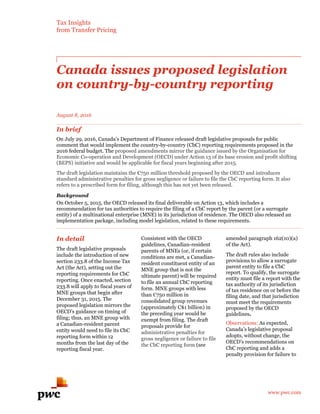pwc-TP-Canada-proposed-CbCR
- 1. Tax Insights from Transfer Pricing www.pwc.com Canada issues proposed legislation on country-by-country reporting August 8, 2016 In brief On July 29, 2016, CanadaŌĆÖs Department of Finance released draft legislative proposals for public comment that would implement the country-by-country (CbC) reporting requirements proposed in the 2016 federal budget. The proposed amendments mirror the guidance issued by the Organisation for Economic Co-operation and Development (OECD) under Action 13 of its base erosion and profit shifting (BEPS) initiative and would be applicable for fiscal years beginning after 2015. The draft legislation maintains the Ōé¼750 million threshold proposed by the OECD and introduces standard administrative penalties for gross negligence or failure to file the CbC reporting form. It also refers to a prescribed form for filing, although this has not yet been released. Background On October 5, 2015, the OECD released its final deliverable on Action 13, which includes a recommendation for tax authorities to require the filing of a CbC report by the parent (or a surrogate entity) of a multinational enterprise (MNE) in its jurisdiction of residence. The OECD also released an implementation package, including model legislation, related to these requirements. In detail The draft legislative proposals include the introduction of new section 233.8 of the Income Tax Act (the Act), setting out the reporting requirements for CbC reporting. Once enacted, section 233.8 will apply to fiscal years of MNE groups that begin after December 31, 2015. The proposed legislation mirrors the OECDŌĆÖs guidance on timing of filing; thus, an MNE group with a Canadian-resident parent entity would need to file its CbC reporting form within 12 months from the last day of the reporting fiscal year. Consistent with the OECD guidelines, Canadian-resident parents of MNEs (or, if certain conditions are met, a Canadian- resident constituent entity of an MNE group that is not the ultimate parent) will be required to file an annual CbC reporting form. MNE groups with less than Ōé¼750 million in consolidated group revenues (approximately C$1 billion) in the preceding year would be exempt from filing. The draft proposals provide for administrative penalties for gross negligence or failure to file the CbC reporting form (see amended paragraph 162(10)(a) of the Act). The draft rules also include provisions to allow a surrogate parent entity to file a CbC report. To qualify, the surrogate entity must file a report with the tax authority of its jurisdiction of tax residence on or before the filing date, and that jurisdiction must meet the requirements proposed by the OECD guidelines. Observations: As expected, CanadaŌĆÖs legislative proposal adopts, without change, the OECDŌĆÖs recommendations on CbC reporting and adds a penalty provision for failure to
- 2. Tax Insights 2 pwc file. While the proposed legislation will not be implemented before completion of the comment period on September 27, 2016, it seems likely, given CanadaŌĆÖs past endorsement of and adherence to the OECDŌĆÖs guidance on transfer pricing, that any changes to the proposed amendments will be made only if they are consistent with the OECD guidelines. In addition, while the specific details of the CbC information required to be reported have not been included in the draft legislation, it is expected that the prescribed form will closely mirror tables 1, 2, and 3 as proposed by the OECD in Action 13. While the 2016 federal budget indicated that Canada agrees with and intends to follow the OECDŌĆÖs recommendations on transfer pricing, the legislative proposals do not include any other changes relating to transfer pricing, such as the additional documentation requirements recommended by Action 13 with respect to the master file and local file. It remains to be seen how this revised documentation standard will be implemented in Canada. The takeaway Now that CbC reporting requirements are imminent for Canadian taxpayers, with first reports due at the end of 2017 for MNE groups with December 31 year-ends, it is crucial that MNEs immediately begin to review their data collection and processing capabilities to assess any gaps or inconsistencies so that these can be addressed before the deadline. Compiling this information early also will give taxpayers sufficient time to properly evaluate what information, if any, should be included in table 3 (Additional Information) of their CbC report that might facilitate an understanding of the data, and how that information should be presented. LetŌĆÖs talk For a deeper discussion of how this issue might affect your business, please contact: Transfer Pricing Andrew McCrodan, Toronto +1 416 869 8726 andrew.f.mccrodan@pwc.com Gord Jans, Toronto +1 416 815 5198 gordon.r.jans@pwc.com Junaid Mirza, Toronto +1 416 687 8609 junaid.mirza@pwc.com Transfer Pricing Global and US Leaders Isabel Verlinden, Brussels Global Transfer Pricing Leader +32 2 710 44 22 isabel.verlinden@be.pwc.com Horacio Pe├▒a, New York US Transfer Pricing Leader +1 646 471 1957 horacio.pena@pwc.com Stay current and connected. Our timely news insights, periodicals, thought leadership, and webcasts help you anticipate and adapt in today's evolving business environment. Subscribe or manage your subscriptions at: pwc.com/us/subscriptions SOLICITATION ┬® 2016 PwC. All rights reserved. PwC refers to the PwC network and/or one or more of its member firms, each of which is a separate legal entity. Please see www.pwc.com/structure for further details. This content is for general information purposes only, and should not be used as a substitute for consultation with professional advisors. PwC helps organisations and individuals create the value theyŌĆÖre looking for. WeŌĆÖre a network of firms in 157 countries with more than 195,000 people who are committed to delivering quality in assurance, tax and advisory services. Find out more and tell us what matters to you by visiting us at www.pwc.com

